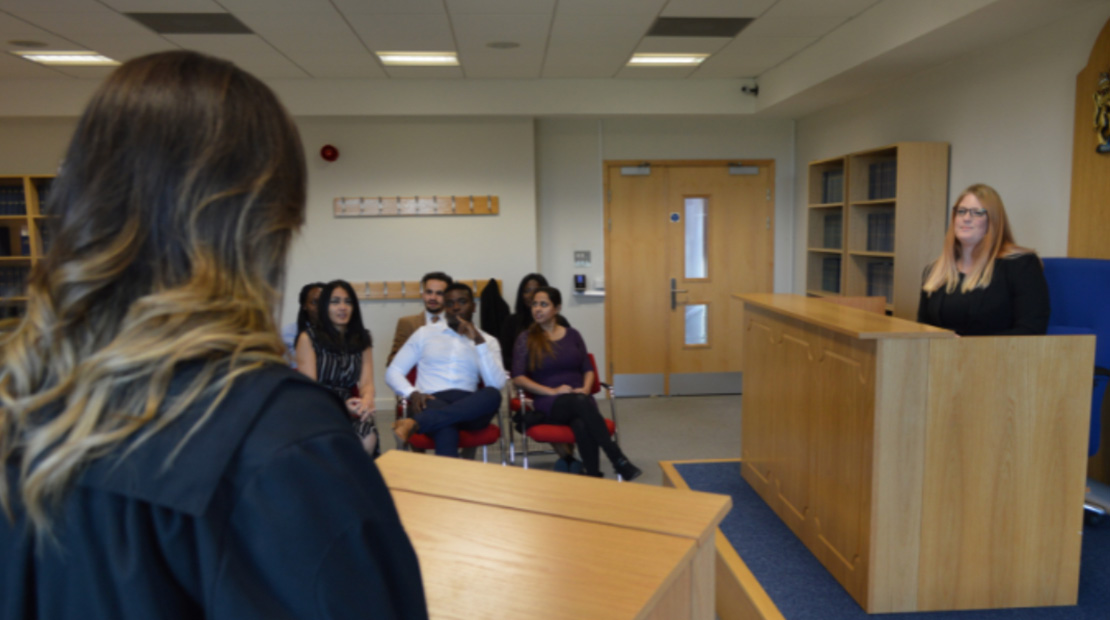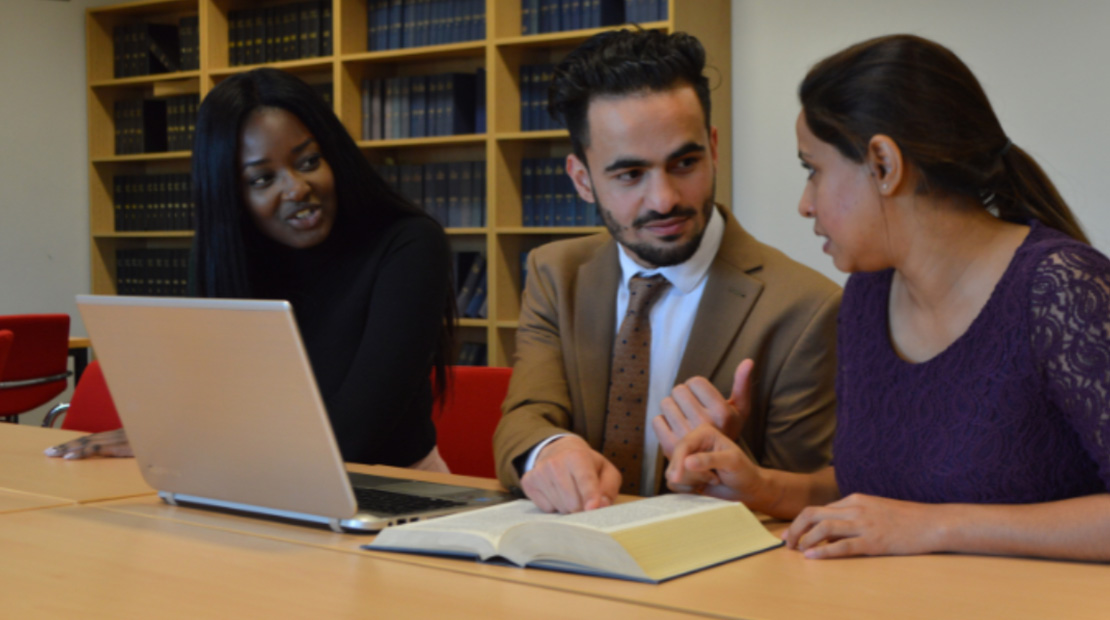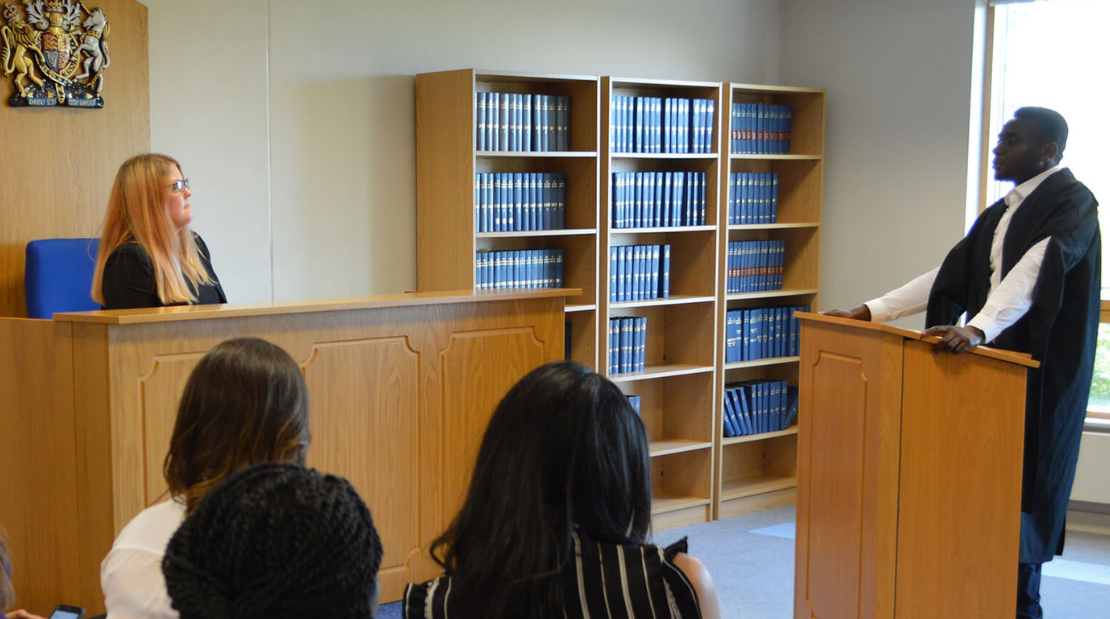Train with leading legal experts and academics to gain the knowledge and skills you need to launch a career in law. The Roehampton undergraduate LLB (Hons) Law degree is recognised by the Bar Standards Board (BSB) as a qualifying law degree (QLD).
Entry Tariff
112–120 UCAS points (or equivalent)
Foundation Year entry: 64 UCAS points (or equivalent)
UCAS Code
M100
M101 (if choosing Foundation Year)
Duration
3 years (full-time)
4 years (full-time) if opting for the additional placement year
4 years (full-time) if opting for Foundation Year entry
Start date
September 2024
Degree Type
LLB (single honours)
Course also available with Foundation Year
Modules
These modules are those we currently offer and may be subject to change.
This course is offered as a degree with foundation year – a four-year programme which provides an additional foundation year at the beginning of the degree, that will give you academic and practical experience, as well as the skills you need to ensure you are equipped to successfully complete your chosen degree.
£2,000 Foundation Scholarships for all home students
Find out more about our degrees with a foundation year
Core modules (all programmes)
Communication for Academic Purposes 1
This module aims to equip students with:
1. A basic understanding of use of English for Academic Purposes (terminology, concepts, ideas, etc.) in order to engage successfully with the level 4 modules on a degree programme;
2. A thorough grounding in academic study skills (essay structure, referencing, journal and library research, etc.) to prepare them for further study in Higher Education;
3. Confidence in their own abilities to use Reading, Writing and Spoken English effectively for academic purposes and to carry out further study;
4. Transferable and lifelong learning skills, to support continuing professional development and educational achievement.
Communication for Academic Purposes 2
This module aims to equip students with:
1. Enhanced core skills in English, to a level that would be required in order to engage successfully with the level 4 modules on a degree programme;
2. A basic understanding of use of English for Academic Purposes (terminology, concepts, ideas, etc.) in order to engage successfully with the level 4 modules on a degree programme;
3. A thorough grounding in academic study skills (essay structure, exam technique, referencing, journal and library research, etc.) to prepare them for further study;
4. Confidence in their own abilities to use Reading, Writing and Spoken English effectively for academic purposes and to carry out further study;
5. Transferable and lifelong learning skills, to support continuing professional development and educational achievement.
Information Technology and Numerical Concepts
The aims of this module are to introduce students to essential information technology and numerical concepts and to develop their skills, supported by Microsoft Office tools. Students will learn to use Microsoft Office applications to analyse data, manage information, create digital media, and communicate effectively. They will also develop problem-solving and critical thinking skills through hands-on activities, group projects, and case studies. By the end of the module, students should be able to use these effectively and appropriately to support their academic and professional work.
The module will cover the following topics:
1. Introduction to Information Technology
2. Data Management
3. Communication Technologies
4. Digital Media
5. Numerical Concepts
6. Real-World Problem-Solving
This module is designed to provide students with the foundational knowledge and skills needed to succeed in a variety of academic and professional contexts. The use of Microsoft Office tools allows students to develop practical skills that can be applied in their academic work and future careers. The module also addresses the need for students to be proficient in using information technology to effectively manage information, communicate, and solve problems. The module is also relevant to a range of professional contexts, as proficiency in using Microsoft Office tools is often expected in future courses and the workplace. Students will develop a range of academic and professional skills essential for success in higher-level academic courses and in a range of professional contexts. Students who complete this module will be better prepared to use technology and numerical-based problem-solving techniques effectively to support their academic work and future careers.
Academic Inquiry and Exploration
The purpose of this module is to shift the emphasis of learning onto the students and apply subject-specific knowledge to one of the following contemporary topics: in(equality) or a protected characteristic. Students will need to demonstrate the ability to utilise the academic and subject-specific toolkit acquired through previous modules to manage their own learning, and in partnership with your tutors, negotiate, plan and carry out an investigation into the chosen topic. The module requires students to evidence readiness for entry into Level 4 of the degree programme through the e-portfolio which will contain a log of seminar activities.
Law (LLB Law)
Crime, Law and Society
This module will provide students with a broad and critical understanding of the relationship between crime and its social and legal context. It introduces students to key areas of the criminal justice process in England and Wales, as well as issues that are related to criminal justice. Students taking this module will develop the necessary analytical, theoretical and critical skills to examine contemporary problems and debates in the fields of criminal law and justice and will actively engage with empirical research and policy material in these fields.
Introduction to Law and Legal Skills
The aim of this module is to develop a broad knowledge of public and private laws and to develop competencies in legal method to enable students to problem solve and evaluate legal issues in the context of the domain of legal knowledge to be studied. Students will develop competency in legal skills to a standard necessary for successful progression to study law at undergraduate level.
Teaching designed around you
We want to provide you with the flexibility you need while you study, and the contact time to help you succeed.
We schedule our teaching across no more than three days each week for the first year on this degree.
Compulsory modules
Legal Systems, Ethics and Skills
The purpose of this module is to provide a basic introduction to the structure and functions of the English legal system, an opportunity to explore the moral dimension of the practice of law and to develop fundamental evaluative, research and reasoning skills to provide a sound basis for studying undergraduate law modules. In taking this module you will develop an understanding of the organisation and structure of the English legal system and the main principles and ethical considerations which underlie legal institutions, law making and the conduct of legal professionals.
Law in Practice 1: Legal Communication
The purpose of this module is to build students' skill and confidence in legal communication so as to embed their understanding of the application of law in legal practice and wider society. This will be a highly interactive course in which students will learn by doing and work with tutors experienced in legal practice and current practitioners. Students will learn about court etiquette and ethics and basic legal presentational & argument skills and will be able to analyse legal and factual materials and plan and prepare written and oral legal presentations/ argument. The ability to communicate accurately and respond to the arguments and questions of others, as well as evaluate and reflect upon their performance and the performance of others are all key legal and life skills.
Law of Contract 1
The purpose of this module is to introduce the fundamental notions of contract law. Students will appreciate how concepts are developed through case law and understand the relationship between case law and statute. Students will develop the ability to identify the relevant law applicable to the facts presented by a legal problem, recognise the existence of competing arguments and communicate their findings clearly. This will assist the students in their preparation for professional life, enabling them to develop the ability to present reasoned and logical arguments both orally and in writing.
Public Law and Human Rights
The purpose of this module is to provide students with a comprehensive overview of the concepts and characteristics of public law in the United Kingdom. Civil liberties and human rights will be examined through the context of the Human Rights Act 1998, with a particular focus on police powers, freedom of assembly and public order. At the end of the module, students will be able to explain the key principles of public law and human rights and be able to place them within contemporary debates relating to the wider issues of constitutional and political reform.
Criminal Law
The purpose of this module is to introduce students to key criminal law concepts and principles such as what a crime is, actus reus and mens rea. The module will focus on some of the more common specific offences, such as murder, rape, manslaughter, non-fatal offences against the person and theft. The module will detail the key principles such as how a defendant may participate or be an accomplice in a crime; general defences to crimes; and the liability of a person for attempted crimes. Students will be able to define and explain the basic ingredients of a range of criminal offences and defences and apply legal principles, case law and legislation to factual scenarios.
Law Reform
The purpose of this module is to develop students' research and communication skills and the ability of students to exercise academic and critical intellectual skills by studying an element of recent law reform and producing a research report and presentation. Students will investigate an area which is the subject of current debate, and which is an area of practical relevance to the development of the law both as an academic subject and law as it is practised in society. Students will be enabled to carry out research into an area which is of developing importance to the law, showing the ability to take issues of practical importance to the development of the law and to explore those issues in context.
Student Induction
Law Induction
The aim of this module is to provide students with a contextual basis on which to commence their studies in Law by offering a foundation in how to find law and to think like a lawyer.
Teaching designed around you
We want to provide you with the flexibility you need while you study, and the contact time to help you succeed.
We schedule our teaching across no more than three days each week for the first year on this degree.
Compulsory modules
The Law of Torts
This purpose of the module is to develop students' knowledge and understanding of the law of torts and their ability to apply the law to legal problems and solve them. In particular the module will nurture students' ability to develop a reasoned legal argument and to evaluate the merits of competing legal arguments, for example in relation to legal remedies and crossover with the law of Contract. The module helps to develop students' transferable intellectual and professional skills, in order to prepare them for further study and legal practice.
Law of Contract 2
The purpose of this module is to build on the legal principles considered in Law of Contract 1, offering students the opportunity to study contract law in greater depth. In the first part of the module, students will engage with issues of key concern to consumers in a variety of modern contexts. Students will look at different types of contracts and the different legal and commercial arrangements that consumers and businesses make and understand the commercial and legal drivers behind these decisions. Students will also look at the anatomy of contracts, applying their knowledge and understanding of the law of contract in a detailed examination of common terms, duties and liabilities.
Law of Property
This module will focus on the fundamental concepts and principles concerned with ownership and the way in which the law engages with the concept of ownership. Students will understand the legal definition of land, the meaning of land ownership and how land is transferred. Students will develop the ability to identify the different rules relating to ownership of land and legal rights and interests attached to land. Students will also consider how the law adapts longstanding concepts to modern practices and policies, including the means through which property is governed under the legal system and where gaps, if any, exist in the management of property as a legal concept. This module is concerned with the law of England and Wales.
European Union Law
The purpose of this module is to provide the opportunity to study in depth and in context certain areas of constitutional European Union Law. On completion of this module students should be able to demonstrate knowledge and understanding of the decision-making process, sources of EU Law, the principle of supremacy, and the legal remedies for enforcing EU Law. Students will also develop fundamental evaluative, research and problem-solving skills to provide a sound basis for studying undergraduate law modules.
Law of Business Enterprises
This purpose of the module is to provide a basic introduction to the structure and functions of business enterprises and to explore the legal theories, rules and commercial drivers that influence the practice of law concerning limited companies, partnerships and other business models. This module will complement the Law in Practice Year 2 module. In studying this module, students will develop evaluative and analytical skills in understanding the nexus of law and commercial awareness that shapes the behaviours and actions of business enterprises and their stakeholders.
Legal Practice and Commercial Awareness
The purpose of this module is to introduce students to the commercial world, the role of lawyers in that world and how to develop further the essential written skills for a lawyer to function capably within it. The course is predicated on the need for lawyers (1) to understand the broad nature of the commercial world, including how businesses function economically (and in particular the importance of financial markets and how they work), (2) to understand how the business of law functions and is likely to develop, and what practising lawyers actually do; (3) to develop advanced analytical skills to enable them not only to read and understand diverse written material (statutes, judgments, contracts, the business pages of quality newspapers and magazines), but also to evaluate their quality and critique them; and (4) to be able to write clearly and effectively for diverse readers (and without the readers being distracted by the way the relevant pieces are written).
Work Placement Year
Work Placement Year
This module provides an opportunity for an optional work placement year between the second and third year of the degree.
This module is available as an option to all students studying on the listed programmes.
Please note that this is additional to the 360 credits of a 3-year degree programme.
Participating in a work placement year will enable students to develop employability skills across a longer period. It thus complements and builds on the employability skills developed through the curriculum throughout the first two years of the degree programme.
This is a full-time professional work placement in a role with graduate-level learning opportunities. In the event that a placement lasting 12 months (52 weeks) is not possible, or the placement is cut short for any reason, then the placement must last a minimum of 9 months / 39 weeks (that is, each placement should last between 1260-1680 hours).
It is possible that there may be a second employer during the 12-month period, in agreement with the Head of School/Department and Head of Placements and Work Experience.
The aim of the professional placement is to provide students with an opportunity to develop experience in managing real-life issues in the workplace that:
a) will enhance graduate attributes and
b) give an opportunity to critically review and evaluate the relevance of subject-specific-related theories and practices in a real world context.
Students are responsible for sourcing their own placements.
Zero-credit module
Career Preparation
The purpose of this module is to provide a basic introduction to the skills necessary to obtain and succeed on a work placement/period of pro bono work-based learning (WBL). It provides an excellent opportunity for students to develop and apply a range of competencies associated with employment in an area that is of interest to them and for which their undergraduate degree work has provided a suitable preparation.
Before a student may elect to go on a placement or pro bono for Law in Practice 3 (either CAW or Clinical Legal Skills) the following submissions are required (i) CV, (ii) case study covering letter, (iii) case study practice interview.
This course offers all students the option of a one-year paid work placement, to boost your employability even further. If you choose this route, you will take the placement following year two of your course, and then return to complete your degree.
Why take a placement?
A placement year is the perfect opportunity to gain valuable work experience, to build on the career skills we will teach you on this degree. The connections you make on the placement will improve your career prospects further, and equip you with the skills you need to secure graduate-level employment.
How we support you
The University's Placement and Work Experience Team are experts at helping you to secure a placement. They will work closely with you from the start, helping you research potential employers, discover placement opportunities, create and pitch your CV, and will coach you to perform well in interviews. We aren't able to guarantee a placement, but our sector-leading advisors will give you the best possible chance of securing one.
Find out more about how we'll support you
We understand that your plans might change once you start your programme. If you decide not to do a placement, you will have the option of completing the three year version of your programme.
Whatever your choice, you will have access to many opportunities for work experience through our Placement and Work Experience Team, and access to face-to-face and 24/7 online careers support.
Compulsory module
Equity & Trusts
The purpose of this module is to enable students to acquire knowledge and understanding of the law of trusts and appreciate the role of trusts in a variety of modern contexts. Students will study the rights, duties and powers of settlors, trustees and beneficiaries and develop the ability to apply relevant legal principles to complex fact patterns. Students will learn when a fiduciary relationship exists and how to recognise when a non-express trust may be imposed by equity. Students will explore the evolving use of equitable remedies and the modern day use of the law of trusts.
Compulsory module choice
Law in Practice 3 (Placement)
The purpose of this module is to provide an excellent opportunity for students to develop and apply a range of competences associated with employment in an area of business which interests them. The overall aim of the module is to enhance students' work-related skills, by undertaking practical work in a particular sector and critically evaluating and reflecting on their experience. Students will be encouraged to find their own placements with help and guidance from the University.
Students will need to manage their own learning within the organisation and outside the class-based environment. Key to the module is the need for the student to explore the relationship between the study of law as an academic discipline and the practice of law and its application in the working environment. Students are encouraged to use reflection to enhance, refine and develop personal theories of professional practice, with due regard to ethical, conceptual and contextual needs and/or outcomes.
Law in Practice 3 (Pro bono)
The purpose of this module is to provide an excellent opportunity for students to develop and apply a range of competences associated with employment The overall aim of the module is to enhance students' work-related skills by undertaking practical work in a legal work-related environment and critically evaluating and reflecting on their experience.
Students will need to manage their own learning within the organisation and outside the class-based environment. Key to the module is the need for the student to explore the relationship between the study of law as an academic discipline and the practice of law and its application in the working environment. Students are encouraged to use reflection to enhance, refine and develop personal theories of professional practice, with due regard to ethical, conceptual and contextual needs and/or outcomes.
Law and Legal Research
The purpose of this module is to provide an excellent opportunity for students to develop their research skills and a range of competences associated with producing research output to a high standard. Students will build upon the research and writing skills that they have developed in the course of their legal studies, and will have the opportunity to expand upon an aspect of law that is of relevance to a modern audience, and is likely to be informed by prior legal learning of particular interest to them and may link to their intended field of practice or future career plans.
Students are provided with specific guidance on legal research methodology and legal writing as a part of the of the module. This may include face-to-face lecture-based sessions as well as electronic learning materials. Each student is provided with an academic supervisor who will act as a mentor and critical friend in the design, research and writing of their research essay. Students will have the opportunity to meet with their supervisor on a regular basis over the period.
Clinical Legal Skills
This module offers a form of clinical legal education that provides students with an opportunity to apply their academic legal knowledge in a professional practice environment, thereby enhancing their employability skills and confidence.
Importantly, the clinic also aims to offer ‘Qualifying Work Experience’ (“QWE”) to its student volunteers / alumni.
Optional modules
Corporate Finance and Acquisitions
The purpose of this module is to provide students with an overview of the practical and legal aspects of the sale and purchase of a business of company. At the end of the module students should be able to understand the structure of a sale and purchase and the implications for all parties of the terms agreed. The module will also explore different methods of financing businesses. The module builds on the basic concepts explored by students in the Business Enterprises and Contract 2 modules and helps develop their skills of analysis and commercial awareness, addressing a client's financial and business needs and finding solutions to client problems. The module will develop the students' ability to translate their legal knowledge and skills into the practical context of commercial transactions.
Criminal Evidence
The purpose of this module is to introduce students to the rules and principles of evidence in criminal proceedings. Students will consider application of the law of evidence to factual situations and demonstrate knowledge of the underlying concepts and principles of the law of criminal evidence and understand the context in which the law operates. In particular, students will apply knowledge of the law of evidence and solve problems, developing their ability to evaluate a set of facts and the evidential issues raised and to reason logically.
Employment Law
The purpose of this module is to introduce students to the individual relationship between employer and employee based on an understanding of the common law principles and statutory requirements which relate to the employment contract. Alongside exploring this central and complex relationship, students will also explore termination and documentation of the employment relationship, the impact of business re-organisation on all parties and issues relating to discrimination and equality in the workplace. Some of the seminar and workshop sessions will involve students running elements of a claim on behalf of parties in an Employment Tribunal.
Family Law
The purpose of this module is to enable students to analyse critically the legal and policy framework for family law, to engage in an assessment of the effectiveness of the current family justice system and to facilitate debate on proposals for reform of the law. Students will develop their negotiation and communication skills in workshops and the module will expose them to mediation and other conflict resolution procedures.
International Human Rights
The purpose of this module is to provide students with a comprehensive overview of the theory and practice of international and regional legal frameworks in place to protect human rights. Wherever possible, the discussion of international human rights law will relate to contemporary developments in human rights to foster global and cultural insights and enable students to assess how it is used in practice. In particular, students will look at a broad and critical appreciation of the history, theory, politics and practice of the International Law of Human Rights and compare, contrast and evaluate different regional and international approaches to the protection of human rights. After completion of this module, students should be able to effectively apply their knowledge to address contemporary developments and challenges and contribute critically to key issues in this field.
Medical Law and Ethics
This module will focus on the legal and ethical issues surrounding the provision of medical treatment and care. Medical research has facilitated advancements in the treatment and care of patients and the module will examine those developments and the new dilemmas posed at the beginning and end of life. The module will examine how ethical principles are applied to medical decisions, and the extent to which such ethical principles are incorporated into the legal standards applied to medical decisions.
Tax Law
The purpose of this module is to provide an understanding of the fundamental principles of UK tax law and an appreciation of its relevance across a wide range of legal disciplines including, succession, sales, business, enterprise, employment and land law. In furtherance of the Law School's Employability objectives the module also provides a foundation in the difference between financial and commercial concepts relevant to tax law, such as income, profit, loss, gains, wealth and dutiable items. Students will learn about the policies informing fiscal legislation, the budgetary process, and the place of tax in the commercial and legal context. The module focuses on legal principles, policies and regulation and fosters the skills of handling complex legal material, reading and interpreting statutory material, and understanding and interpreting the structure of language.
Competition Law
The purpose of this module is to teach students the basic provisions of competition law. The course will introduce both, the EU as well as UK competition rules. However, since the UK competition law is heavily influenced by and intertwined with the existing EU regulations, the focus of the course will be on the EU competition law. The latter is based on the rules contained in Articles 101-109 of the Treaty of the Functioning of the European Union (TFEU) and upon subsequent secondary legislation. This one semester module will however aim to introduce mainly Articles 101/Chapter I Competition Act 1998 and 102 TFEU/Chapter II Competition Act 1998 and Regulation 139/2004 (Merger Regulation) as they form the core of the competition law. The module will teach the students the application of UK and EU competition law in factual situations to comply with the practice-based learning style.
Public International Law
This module provides students with the international law knowledge and professional skills that are essential for the practice of law across the spectrum of areas of regulation in today’s global legal market. It aims at familiarizing students with fundamental characteristics of the international legal order and its normative reach, institutions, procedures, and peculiarities. The module, in addition to presenting perennial and contemporary theoretical and political debates, systematically surveys recent trends and developments in various fields of international legal regulation, while striving to equip students with the practical know-how on international legal materials, where to find them, and how to use them in the employment of effective international legal argument.
Earth in Crisis: Interdisciplinary Approaches
This module will offer a unique interdisciplinary understanding of global ecological crises, as well as exploring approaches to tackle these crises from the perspective of different disciplines. This module is offered across several programmes to allow students to learn and be exposed to environmental issues from different perspectives. It draws on scientific, legal, economics and literary approaches to explore the relationships between the environment and sustainability. Students will learn about the earth crisis from various disciplines, with a specific focus on biodiversity, climate and water.
Optional Summer module
SQE Foundations
This module will provide a foundation for final year LLB students to graduate from the Law School with an understanding of the new Solicitors Qualifying Exam (SQE) route to qualification as a Solicitor.
The module has five objectives:
• To introduce the students to the SQE as a route to qualification as a Solicitor.
• To explain the new Solicitor Regulation Authority rules for Qualifying Work Experience.
• To understand of the new style of multiple-choice assessment for Functioning Legal Knowledge (SQE 1) and the Objective Structured Clinal Examination of Legal Skills (SQE 2).
• To recap previous areas of legal knowledge in Public Law, Legal Systems, Legal Ethics, Contract Law, Property Law, Criminal Law, Tort Law, Business Law and Equity & Trusts.
• To assess the various post graduate legal providers, select the most appropriate form of study route to qualification upon leaving the Law School and provide a sound basis for the further post graduate study of law.
Why this course
Ranked number 1 in UK for student satisfaction (Complete University Guide 2022)
Ranked top 10 in London and top 30 in the UK for satisfaction with teaching (Guardian University Guide 2024)
You'll get the essential high-quality legal context that is aligned with the Solicitors Qualifying Examination (SQE1 and SQE2). It also meets the requirements of the Bar Standards Board (BSB) and Chartered Institute of Legal Executives.
Gain real-world legal work experience through our Law Clinic, in partnership with the Citizens' Advice Bureau.
Opportunity to study an optional mini-SQE module to help pass your SQE assessments.
Skills

Ranked 1st in London for student satisfaction (Complete University Guide 2022), the Roehampton Law School offers a practice-based approach to learning and a strong foundation for your future career.
Studying for our LLB (Hons) Law degree will give you a wide range of transferable skills, setting you up for success in any profession. You’ll learn how to:
- Construct a winning argument
- Reason critically
- Think on your feet
- Write with precision and clarity
Read more
You can put these skills into practice with an optional professional placement between Years 2 and 3 of your course. Fully supported by our Placement Office, this is a chance to gain paid work experience and make valuable industry connections.
Read former law student, Julia Cwierz's blog 'My Citizens Advice Placement', where she talks about her experience of doing pro bono work with Wandsworth Citizens Advice.
Professional recognition
If you want to train as a barrister after graduation, this course is the perfect first step as a qualifying law degree (QLD).
Although you no longer need a QLD to become a solicitor, the Roehampton LLB (Hons) Law degree will give you the essential high-quality legal context that is aligned with the Solicitors Qualifying Examination (SQE1 and SQE2). It also meets the requirements of the Bar Standards Board (BSB) and Chartered Institute of Legal Executives.
How you'll learn
Get ahead with our ‘law in practice’ learning environment.
Designed by experienced academics and practitioners, with input from our internationally renowned Centre for Human Rights and Social Justice, this degree will encourage you to see the law in the context of everyday life right from the start.
You’ll spend most of your time in face-to-face classes, developing your understanding of both legal issues and the core skills and competencies legal practitioners are expected to have.

Read more
Mandatory course modules include:
- Legal Systems
- Ethics and Skills: covering the structure and function of the English legal system
- Public Law and Human Rights
- Law in Practice: focusing on legal communication in Year 1 and business and commercial awareness in Year 2
As you progress, you’ll be able to shape your own studies and explore different specialisms. Optional areas of study include:
- Corporate Finance and Acquisitions
- Family Law
- Public International Law
- Medical Law and Ethics
- Competition Law
Whichever modules you choose, you’ll be taught by experts – former solicitors, barristers and/or active researchers who publish widely in Environmental Law, Human Rights Law, Legal History and Commercial Law.
Beyond the Roehampton Law School, you’ll have opportunities to experience legal work in action through:
- The Roehampton Law Clinic
- Pro-bono placements (in partnership with Wandsworth Citizens’ Advice)
- Industry talks with guest speakers from across the sector
- An optional year-long paid work placement
- Visits to historic legal institutions, including Parliament, the Supreme Court, the Old Bailey, the four Inns of Court, the Law Society and the Royal Courts of Justice
Your tutors
Who Teaches Law?
How you'll be assessed

Evaluate your progress through real-world assessments.
During your time at Roehampton Law School, your projects, exercises, and assessments will reflect the contemporary working world of law, getting you ready for life after graduation.
Many of your modules will also contain a multiple-choice test component. This prepares you for the Solicitors Qualifying Examination (SQE), which must be taken by anyone wishing to become a solicitor in England and Wales.
Upcoming Events:
Career options
Secure a sustainable legal career in a rapidly changing world.
With an LLB (Hons) Law degree from Roehampton, you’ll be ready to pursue a wide range of legal roles, including:
- Solicitor (requires completion of the SQE and qualifying work experience)
- Barrister (requires completion of the Bar Training Course)
- Paralegal
- Law academic (requires further study at Masters and Ph.D level)

Read more
You’ll also have the critical reasoning skills to succeed in many other fields, such as:
- Business
- Journalism
- Banking
- Prison and probation service
- Mediation
- Local Government
- Wealth management
- Human Resources
- Politics
- Advertising
- Charity
- Teaching
- Finance
- HMRC
- Publishing
- Insurance
- Management
The Roehampton careers team is available to support you from the start of your studies until after you graduate.
You’ll benefit from personalised sessions in CV and application writing, presentation practice, mock interviews, and commercial-awareness training. You’ll have the chance to meet future employers through our network of industry partners across London. Our dedicated Law Careers Advisor will connect you with graduate recruiters and support you through every step of your career planning and job search.
Application Info
How to apply
Undergraduate programmes
- September 2024 entry: Home (UK) students – apply through UCAS (Roehampton UCAS institution code is R48)
Apply now for September 2024 entry through UCAS
- September 2024 entry: International students- apply using our direct application form
Apply now for September 2024 entry
If you need any help or advice with your application, or just want to ask us a question before you apply, please do not hesitate to contact us.
We welcome applicants with a wide range of qualifications, including BTECs, A-levels and T Levels.
When we consider applications to study with us, we form a complete view of your achievements to date, and future potential. In some cases, we will make you a contextual offer. Contextual offers ensure that all applicants have a fair opportunity of gaining a place with us, regardless of their background. Find out more about contextual offers.
Detailed advice on applying for an undergraduate degree is available on our How to apply page.
Tuition fees and funding
September 2024 entry tuition fees
Year 1 fees, see links in table below for more information.
We offer a wide range of scholarships and bursaries. See our 2024 financial support pages for UK students, and for international students.
We also provide other ways to support the cost of living, including free buses and on-campus car parking, hardship support and some of the most affordable student accommodation and catering in London. Find out more about how we can support you.
Entry Tariff
We welcome applications from students studying T Levels.
For all courses we also accept a wide range of other qualifications and experience. Contact us to find out more.
When we consider applications to study with us, we form a complete view of your achievements to date, and future potential, and can offer flexibility in entry requirements. Find out more about our Contextual Offer scheme.
Specific entry requirements
A-level (or equivalent qualification) required in Humanities, Social Sciences, and Business preferred.
GCSE (or equivalent) requirement: English and Maths, Grade C / 4.
Contact us for further information.
General entry requirements
Contextual offers
When we consider applications to study with us, we form a complete view of your achievements to date, and future potential, and can offer flexibility in entry requirements.
Find out moreNeed help before you apply?
Course Facilities
Our Students
Get real advice directly from our students
Speak to one of our students using the UniBuddy app now










